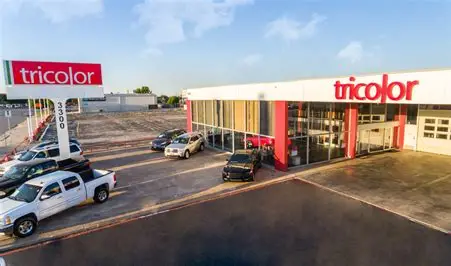Tricolor Dealership Faces Fraud Allegations: Imagine walking into a car dealership, excited about driving off in a new ride, only to later discover the company is crumbling under fraud claims and financial chaos. That’s the stark reality unfolding at Tricolor Dealership right now. As a major player in the subprime auto lending space, Tricolor Car Dealership has served thousands of customers, particularly those with limited credit histories. But recent events have thrust it into the spotlight for all the wrong reasons. In this article, we’ll dive deep into the unfolding drama, breaking down the fraud allegations, store closures, and bankruptcy proceedings. You’ll walk away with a clear understanding of what went wrong, how it affects everyday car buyers, and practical tips to safeguard your next vehicle purchase. Whether you’re in the market for a car or just curious about the auto industry’s underbelly, this read will equip you with valuable insights to make smarter decisions.

The Rise of Tricolor Car Dealership: A Brief Background
Tricolor Dealership, officially known as Tricolor Holdings, started as a beacon of hope for underserved communities. Based in Irving, Texas, this subprime auto lender and dealer specialized in helping people without traditional credit scores secure vehicles. They positioned themselves as more than just a car seller—they emphasized social impact, earning praise for ESG (Environmental, Social, and Governance) initiatives that aimed to empower low-income buyers. With a network of around 65 locations across Texas and beyond, Tricolor Car Dealership grew rapidly, financing used cars for customers who might otherwise be turned away by mainstream banks.
However, growth often comes with risks. Subprime lending involves higher interest rates and greater default potential, which can strain operations if not managed carefully. Tricolor’s model relied heavily on asset-backed loans from major banks to fund their inventory and customer financing. This setup worked until cracks began to show, leading to the explosive allegations we’re seeing today.
Unraveling the Fraud Allegations Against Tricolor Dealership
The trouble escalated when Fifth Third Bank, a key lender to Tricolor, uncovered what they described as “alleged external fraudulent activity” tied to a $200 million asset-backed loan. This bombshell dropped just before Tricolor’s bankruptcy filing, sending shockwaves through the financial world. The bank reported a massive impairment charge, essentially writing off the loan due to suspicions of misconduct.
Details are still emerging, but the allegations point to potential irregularities in how Tricolor managed its loan portfolios or reported asset values. Federal prosecutors have now stepped in, launching an investigation into the matter. This isn’t just a civil dispute; it could involve criminal elements, highlighting the severity of the claims. Banks like Fifth Third and potentially others, including JPMorgan, are facing hundreds of millions in losses, underscoring how interconnected the auto finance ecosystem is.
For consumers, this raises red flags about transparency in dealership operations. If fraud is proven, it could mean that some customer loans were based on inflated or misrepresented assets, though direct impacts on individual buyers remain unclear at this stage.
Read More: Business Automation Case Studies: Your Blueprint for Efficiency & Growth in 2025
How Fraud Allegations Impact Trust in the Industry
Beyond Tricolor Dealership, these events erode confidence in subprime lenders overall. When a company touted for its ethical practices faces such scrutiny, it prompts questions about oversight in the sector. Regulators might tighten rules, but in the meantime, buyers should stay vigilant.
Store Lockdowns: The Immediate Fallout for Tricolor Locations
As the fraud storm brewed, Tricolor Car Dealership began locking doors at its outlets. Reports indicate the company is shutting down 65 locations, a move that started in August as preparations for bankruptcy intensified. These “door lockdowns” aren’t just metaphorical—they’re literal closures, leaving employees jobless and customers scrambling for service.
Picture this: You financed a car through Tricolor last month, and now your local dealership is boarded up. Where do you go for warranty work or payments? This chaos stems from the company’s decision to liquidate, halting operations abruptly. It’s a harsh reminder of how quickly a business can pivot from thriving to shuttered.
What Customers Should Do During Lockdowns
If you’re affected, don’t panic. Contact any remaining Tricolor channels or check for updates on their website. In many cases, loans might be transferred to other servicers, but verifying this early is key.
The Bankruptcy Filing: Diving Into the Details
On September 10, 2025, Tricolor Holdings filed for Chapter 7 bankruptcy in Texas court, opting for liquidation rather than reorganization. This means assets will be sold off to pay creditors, with the company claiming over $1 billion in liabilities. Unlike Chapter 11, which allows for restructuring, Chapter 7 signals the end of the road for Tricolor as we know it.
The filing comes amid mounting pressures from banks reporting losses—Fifth Third alone is out $200 million, and the total could climb higher as probes continue. Tricolor’s downfall highlights the vulnerabilities in subprime auto lending, where economic shifts like rising interest rates can amplify risks.
Broader Economic Implications
This bankruptcy isn’t isolated. It could tighten credit for subprime borrowers industry-wide, making car loans harder to get. Lenders might become more cautious, indirectly raising costs for consumers with imperfect credit.
Impact on Customers and the Auto Industry
For existing Tricolor customers, the bankruptcy raises immediate concerns. Your car loan doesn’t vanish—it’s likely to be sold to another lender, but terms should remain the same under consumer protection laws. However, servicing disruptions could occur during the transition.
In the bigger picture, this saga exposes cracks in the auto finance model. Subprime lenders like Tricolor Dealership fill a vital gap, but when they falter, it disproportionately affects low-income communities. The industry might see increased scrutiny, potentially leading to better regulations but also higher barriers for entry-level buyers.
One silver lining? It pushes consumers toward more informed choices, emphasizing the need for due diligence before signing on the dotted line.
Tips for Navigating Car Dealerships Safely
To avoid getting caught in similar drama, arm yourself with these actionable strategies:
- Research Thoroughly: Before visiting any dealership, including Tricolor Car Dealership alternatives, check online reviews on sites like BBB or Yelp. Look for patterns in complaints about financing or service.
- Understand Loan Terms: Subprime loans often come with high interest—calculate the total cost using online tools. Ask for a full disclosure of fees and avoid rushed decisions.
- Verify Financial Stability: A quick search for recent news on the dealership can reveal red flags like lawsuits or financial woes.
- Explore Alternatives: Consider credit unions or online lenders for better rates. Building credit through smaller steps, like secured cards, can open doors to prime financing.
- Get Everything in Writing: Never rely on verbal promises. Document all agreements to protect yourself in case of disputes.
By following these tips, you can steer clear of potential pitfalls and secure a deal that works for you long-term.
Conclusion: Lessons from the Tricolor Saga
The Tricolor Dealership story is a cautionary tale of ambition meeting reality in the high-stakes world of auto finance. From fraud allegations and store lockdowns to a full-blown bankruptcy, it’s a reminder that even established players can falter. While the fallout continues, with federal investigations ongoing and banks licking their wounds, the key takeaway is empowerment through knowledge.
If you’re a Tricolor customer or eyeing a car purchase, stay proactive—monitor your accounts, seek advice from financial experts, and prioritize transparency. Have you experienced issues with subprime lenders? Share your story in the comments below or subscribe to our blog for more updates on auto industry trends. Knowledge is your best defense—drive safely out there!
Follow us on








